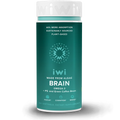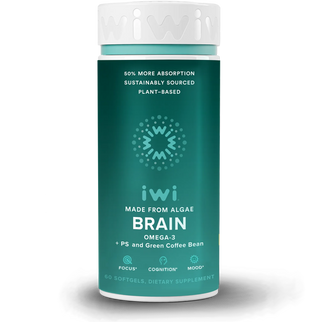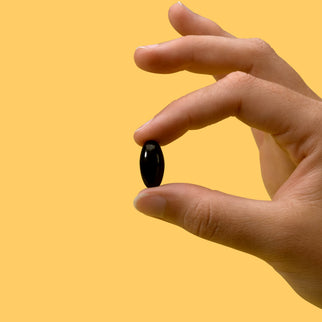When people talk about health and wellness, a lot of the conversation revolves around physical aspects. It’s easy to gauge health based on factors that we can see, such as weight and body composition. However, what’s happening underneath the surface might be an even better indicator of health.
Over the years, brain health and neurology have gained more focus within the fitness world. The human brain is a highly complicated organ that’s essential for life. While there are many nutrients that are beneficial for our brains, perhaps the best one of them is omega-3 fatty acids.
Understanding the connection between omega-3 fatty acids and our brains is crucial when attempting to support our mental well-being and overall wellness. Join us as we dive into the relationship between these two and how omega-3 can impact our brain function and development while supporting our mental health and overall brain wellness.
What Are Omega-3 Fatty Acids?
Omega-3 fatty acids are polyunsaturated fatty acids (PUFAs) that play a variety of crucial roles in our bodies, fulfilling various functions that contribute to our overall health. There are essentially three types of omega-3 fatty acids:
Docosahexaenoic Acid (DHA)
In terms of the brain, DHA is arguably the most important omega-3. In fact, DHA is a primary structural component of the brain, representing approximately 20% of the brain's total fat content.
Not only that, but DHA plays a crucial role in brain development and function, supporting the structure and fluidity of cell membranes in the brain. This, in turn, supports effective communication between brain cells, a fundamental aspect of optimal brain function and cognitive performance.
Eicosapentaenoic Acid (EPA)
EPA is instrumental in managing tension within the body and plays a significant role in supporting heart health by maintaining healthy blood pressure.
Additionally, a balanced level of EPA can contribute to overall emotional wellness and mental clarity, which are integral components of overall brain health.
Alpha-Linolenic Acid (ALA)
ALA is a precursor to EPA and DHA. However, it's important to note that the body's conversion rate of ALA to EPA and DHA is relatively low.
While there are certainly health benefits associated with ALA, it’s not as beneficial as EPA or DHA.
What Foods Are the Best Sources of Omega-3?
Plenty of foods have varying levels of omega-3s. Here are some foods that are rich in this beneficial compound:
- Oily fish: Mackerel, sardines, salmon, and other fatty fish are excellent sources of long-chain omega-3s, specifically EPA and DHA, which are readily available for the body to use.
- Plant-based sources: Flaxseed, chia seeds, and walnuts primarily contain ALA, a type of omega-3 that’s less beneficial than DHA and EPA. However, they still play an important role in a balanced diet.
While eating fish is a common way to increase omega-3 levels in your body, iwi life offers up an alternative. Our omega-3 fatty acid supplements are especially beneficial for meeting the needs of a diverse range of consumers, including vegans, vegetarians, and those who may have allergies or ethical concerns associated with fish consumption.
iwi life’s omega-3 supplements are derived from algae, a sustainable and eco-friendly source of long-chain omega-3s (DHA and EPA). Our supplements are produced without the use of harmful chemicals and feature proprietary strains of algae, such as Nannochloropsis.
Perhaps best of all, our algae is farmed in desert pond beds using salty water from underground aquifers, showcasing our commitment to sustainability and environmental stewardship. It’s the perfect alternative for people who don’t want to increase their fish intake or take omega-3 fish oil capsules.
How Do Omega-3s Interact With the Brain?
Omega-3 fatty acids are crucial components of cell membranes in the brain, providing the fluidity and flexibility necessary for optimal brain cell communication. Notably, DHA plays a vital role in cognitive function as it represents a significant portion of the brain’s gray matter.
Here are some of the benefits of omega-3 for the brain:
Neuron Development
Omega-3s, particularly DHA, are essential for proper neurodevelopment. They contribute to the growth and functional development of the brain in infants, playing a key role in visual acuity and cognitive development.
Neuron Function
Omega-3s support neuron function by maintaining the fluidity of cell membranes, which is crucial for the transmission of signals between neurons and neurotransmitters. This fluidity facilitates efficient communication, supporting overall brain function and responsiveness.
These essential fatty acids also provide neuroprotection. They help maintain brain integrity and function, potentially helping to support a healthy brain even as you age.
Cognition and Memory Support
The effect of omega-3s on cognition and memory is profound. Adequate levels of DHA and EPA support neuroplasticity, which is the brain's ability to form new neural connections essential for learning and memory.
What Are the Implications of Omega-3 Deficiency on Brain Health?
Omega-3 fatty acids can’t be made by your body, which means you have to get them from your diet. Unfortunately, that makes the chances of experiencing an omega-3 deficiency much higher.
Those with a higher risk factor for omega-3 deficiency include older adults, vegans, and people with malabsorption issues. These individuals must take greater care to meet their daily requirements of omega-3s or risk a deficiency.
An omega-3 fatty acid deficiency can have severe implications for brain health, ranging from mild cognitive impairment to an increased risk of neurodegenerative health conditions. Here are just a few examples of the side effects of an omega-3 deficiency:
- Poor memory
- Difficulty concentrating
- Mood swings
- Mental health struggles
- Learning disabilities
- Mental fatigue
How Can You Ensure You're Getting Enough Omega-3s for Brain Health?
In order to avoid an omega-3 deficiency, it’s essential that you get enough omega-3 each day. Healthcare providers often recommend a combined average of 1.1 to 1.6 grams of DHA and EPA per day for general health. A few ounces of fish is all it takes to meet these requirements. However, supplements can offer a more convenient option.
iwi life's supplements provide a sustainable and effective source of preformed DHA and EPA derived from our proprietary strain of algae, Nannochloropsis. Our supplements provide a plant-based alternative to fish oil supplements, supporting overall brain health without the need for frequent fish consumption.
What Are Some Additional Ways That You Can Support Your Brain?
Your brain is the command center of your body and deserves to be treated with care. In addition to incorporating omega-3 fatty acids into your diet, there are several other ways you can support optimal brain health.
Healthy Diet
A balanced and nutrient-rich diet is like premium fuel for your brain. Incorporate a colorful array of fruits and vegetables, whole grains, and lean proteins to provide a wide range of essential nutrients that support overall brain function.
Foods rich in antioxidants, good fats, vitamins, and minerals provide energy and can aid in protecting your brain. Eating nutrient-rich foods also plays a vital role in brain health and can improve specific mental tasks, such as memory and concentration.
Physical Activity
Engage in regular physical activity to enhance cognitive functions and protect your brain from age-related decline.
Exercise improves memory, stimulates the production of growth factors, and promotes the growth of new neuronal connections in the brain. It also increases blood flow to the entire body, including the brain, which can help improve overall cognitive performance and mood.
Adequate Sleep
Prioritize getting seven to nine hours of quality sleep per night to support your brain's ability to rest and rejuvenate. During sleep, your brain removes toxins that accumulate throughout the day, consolidates memories, and forms neural connections.
A lack of adequate sleep can impair attention, alertness, problem-solving skills, and the ability to learn.
Mental Stimulation
Challenge your brain with mentally stimulating activities, such as reading, solving puzzles, learning a new language, or acquiring a new skill.
Engaging in these activities can improve brain function, enhance neuroplasticity, and protect against cognitive decline. Just as physical exercise strengthens the body, mental stimulation helps to strengthen the brain and keep it sharp.
Stress Management
Manage stress effectively by incorporating stress-reducing activities, such as yoga, meditation, or deep breathing exercises, into your daily routine.
Chronic stress can have a significant negative impact on your brain health, potentially leading to a variety of mental health conditions. Managing stress is crucial to maintaining optimal brain function and overall health.
Socialization
Maintaining strong social connections and engaging in regular social activities can also support your cognitive function and emotional well-being.
Social interactions stimulate brain regions involved in emotional regulation and cognitive processing. They also provide an opportunity for learning and experiencing new ideas and perspectives, which can contribute to better brain health.
Stay Hydrated
Drink plenty of water throughout the day to maintain optimal brain function. The brain is approximately 75% water, and dehydration can have a negative effect on your attention and long-term memory.
Staying hydrated is essential for maintaining the balance of brain fluids and ensuring optimal brain performance. Aim for at least eight glasses of water a day to keep your body functioning optimally.
Limit Alcohol
While moderate alcohol consumption has been associated with certain health benefits, excessive drinking can have detrimental effects on brain health.
If you choose to drink, do so in moderation to prevent potential negative impacts on your memory, cognition, and overall brain function.
Quit Smoking
Smoking has a range of negative effects on brain health and cognitive function. It can lead to a reduction in brain volume, affect neurotransmitter systems, and increase the risk of neurodegenerative diseases.
If you smoke, seek support or consider interventions such as counseling or medications to help you quit.
The Takeaway
As you can see, omega-3 can have a profound effect on brain health. Cognitive function and the creation, function, and protection of neurons are all influenced by the DHA levels in your brain.
Unless you’re a massive fan of seafood, it can be challenging to meet your daily requirements for omega-3. Fortunately, iwi life is there to step in and help out.
Our environmentally friendly omega-3 supplements are derived from algae and can help you get enough omega-3 in your daily routine. Explore our variety of products and embrace the full spectrum of benefits for your brain and overall wellness with iwi life.
Sources:
Human Brain: Facts and Information | National Geographic
Docosahexaenoic Acid (DHA): An Ancient Nutrient for the Modern Human Brain | PMC
Marine Omega-3 (N-3) Fatty Acids for Cardiovascular Health: An Update for 2020 | PMC
Omega-3 Fatty Acids: An Essential Contribution | The Nutrition Source
Omega-3 Fatty Acids | Health Professional Fact Sheet | National Institutes of Health


















